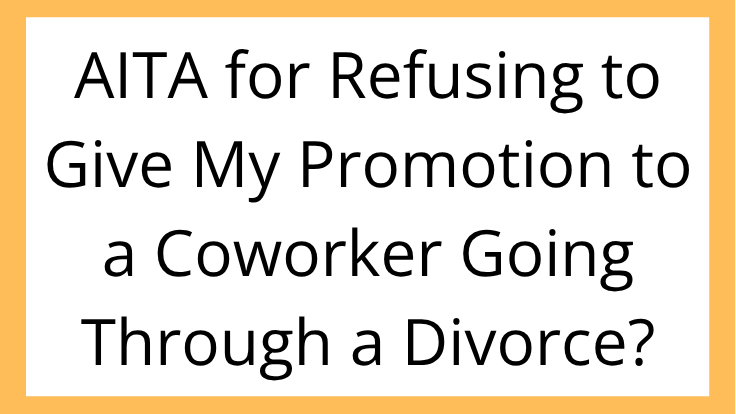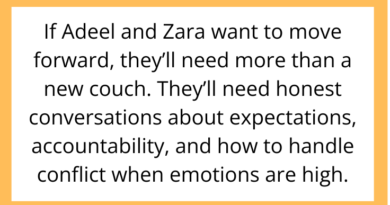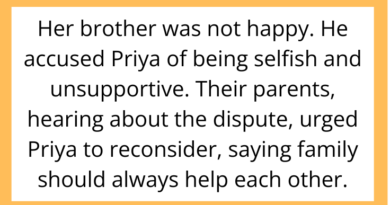AITA for Refusing to Give My Promotion to a Coworker Going Through a Divorce?
I Got the Promotion of My Dreams—And Then Everything Went Sideways
I (31F) recently landed a promotion at work after years of hard effort and late nights. I should have been celebrating. Instead, I found myself the center of a workplace controversy that made me question everything. Why? Because I didn’t give up my promotion to a coworker (33F) going through a divorce.

The Climb: My Professional Journey So Far
I’ve worked at this marketing firm for nearly six years. I started as an assistant and slowly worked my way up through sheer perseverance. My recent promotion to Senior Campaign Strategist was something I’d been preparing for over the past year—taking on extra projects, mentoring juniors, and even volunteering for cross-team initiatives.

My coworker, Rachel, started around the same time I did. While talented, she often declined extra responsibilities, citing work-life balance. We were cordial but not particularly close.
The First Signs of Trouble: Rachel’s Divorce and the Guilt Campaign
A few weeks before the promotion announcement, Rachel began going through a messy divorce. She was visibly stressed, missed several deadlines, and leaned heavily on team members for emotional support. When the promotion was announced—and I got it—Rachel congratulated me… but her tone felt forced.

The next day, she pulled me aside and said, “I know you worked hard, but you don’t understand how much I need this right now. It would help me keep my kids in their school and boost my custody case.”
I was stunned.
The Pressure Builds: HR Hints and Coworker Criticism
It didn’t stop there. Rachel began talking to others about how unfair it was. Soon, I noticed subtle shifts in the office atmosphere—colleagues giving me cold stares, group chats going silent when I entered.

Then came the meeting with HR.
They didn’t ask me to give up the promotion directly, but said things like, “We value team harmony,” and “It’s important we show empathy during hard times.” One rep even asked if I’d “consider stepping aside temporarily.”
I was shocked—and furious.
The Breaking Point: Drawing the Line

That night, I couldn’t sleep. Was I really being seen as selfish for not giving up something I earned?
I asked myself: If the roles were reversed, would Rachel give me the same grace? Probably not. I didn’t want to create drama, but I also couldn’t set a precedent where promotions are handed over based on personal life struggles instead of performance.
I emailed HR and clearly stated I would not relinquish the role. I also requested a formal statement confirming my position.
The Fallout: Workplace Division
Some people supported me privately—saying they admired my strength. But others openly criticized me. Rachel went on a week-long leave and sent an email saying she was “taking time to deal with workplace hostility.”

The tension is still thick. A few colleagues have distanced themselves from me, and others remain neutral. Management hasn’t commented since my email, but I get the feeling this situation will shadow my promotion for a while.
The Moral Crossroads: Career vs. Compassion?

This situation has left me wrestling with a moral dilemma: Should career success ever come at the cost of someone else’s pain?
But then I realized—success earned through merit shouldn’t be sacrificed out of guilt. I can have empathy for Rachel’s situation without surrendering something I’ve worked toward for years.
Reddit’s Take: Was I the Asshole?

When I shared my story on Reddit’s r/AITAH, the responses were overwhelmingly on my side.
Top-voted comment:
“NTA. You worked for it. Her personal situation is sad, but it doesn’t entitle her to your job. Boundaries are everything.”
Others chimed in about how this kind of emotional blackmail is too common in workplaces and how HR should have handled it better.
Final Thoughts: Am I the Asshole?

So… AITA for refusing to give up my promotion?
I don’t think so. And thanks to Reddit, I know I’m not alone.
This story isn’t just about one job. It’s about how women in the workplace are often pressured to be caretakers—even at the expense of their own success.
Sometimes, standing your ground isn’t just the right thing—it’s the brave thing.
read more stories like this here


